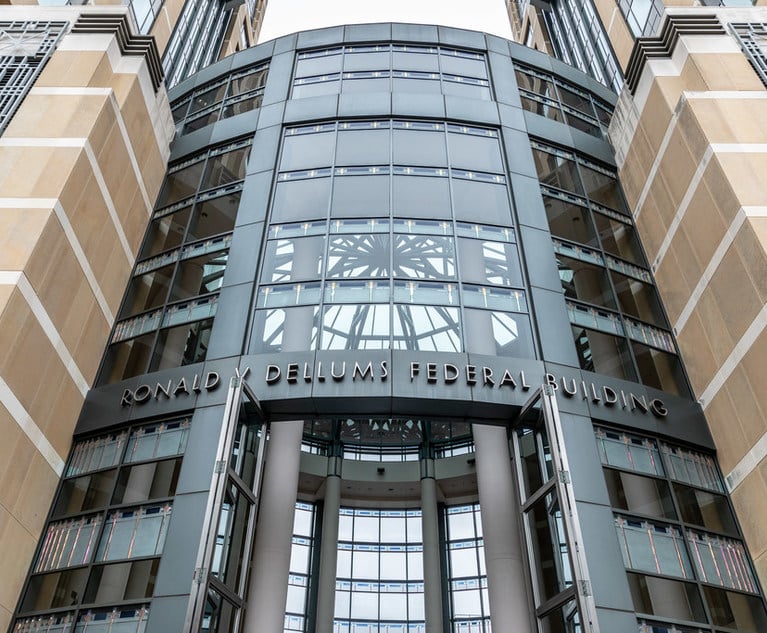DC Circuit Judge Derides $380M Cy Pres Decision as Slush Fund
The 2-1 decision from the U.S. Court of Appeals for the D.C. Circuit allows the use of the controversial practice in a decades-old class action discrimination case.
May 16, 2017 at 05:13 PM
5 minute read
Is it legal to direct leftover funds from a class action settlement to nonprofit groups? One D.C. federal judge offered a resounding “no” in her dissenting opinion Tuesday.
The 2-1 decision from the U.S. Court of Appeals for the D.C. Circuit allows the use of the controversial practice, known as cy pres, in a decades-old class action discrimination case. The majority opinion, written by Judge Harry Edwards Tuesday, upheld the District Court's approval of a revised settlement agreement to distribute the bulk of the $380 million in unclaimed compensation funds to nonprofits working with American Indian farmers.
But Judge Janice Rogers Brown, in a red-hot dissent, wrote that only Congress has the power to distribute government funds — not the courts — and that the leftover money should be returned to the Treasury.
“Cy pres permits the judiciary to take more than half the taxpayer money Congress authorized to pay claims in this case and appropriate the money for something else,” Brown wrote. “This is not justice. It is not even law.”
The majority opinion in this case did not address the legality of cy pres because the plaintiffs never raised the issue in the lower court, Edwards wrote. And Brown's dissent does not inherently side with the appellants, who want all of the remaining funds to be distributed to successful class action claimants.
But Brown wrote that allowing the executive branch to direct money from the Treasury violates the promise of the Constitution's appropriations clause that only Congress has the power to disburse money.
“Perhaps one day, I will possess my colleagues' schadenfreude toward the Executive Branch raiding hundreds-of-millions of taxpayer dollars out of the Treasury, putting them into a slush fund disguised as a settlement, and then doling the money out to whatever constituency the Executive wants bankrolled. But, that day is not today,” Brown wrote.
Judge Robert Wilkins, in a concurring opinion, criticized Brown's dissent. He wrote the settlement was reached via the rule of law and good-faith negotiations.
“The dissent spins a tale of corruption and conspiracy, in which the plaintiffs and the Government were complicit in bilking the nation's taxpayers to pay a political ransom,” Wilkins wrote.
The use of cy pres settlements has met with mixed support from circuit courts, and judges have been quick to blast the agreements when most or all settlement funds go to a charity, leaving little or nothing for class members.
Joseph Sellers, a partner at Cohen Milstein Sellers & Toll who represents the underlying class of farmers, said he doesn't think the use of cy pres in this case is something to be concerned about.
“The successful claimants got somewhere between $50,000 and $250,000 a piece,” Sellers said. “That's hardly a situation where what they received was negligible or nothing.”
The lawsuit, Keepseagle v. Perdue, was originally filed in 1999 and accused the U.S. Department of Agriculture of discriminating against American Indian farmers and ranchers when processing loan applications. A decade of litigation followed, and a $680 million settlement was reached in 2011.
But more than half the money was leftover once the claims were processed, and a provision in the settlement called for those funds to be distributed to nonprofit organizations that serve Native American farmers. The plaintiffs' lawyers initially expected a fraction of the settlement would remain, so they sought to renegotiate with USDA.
The district court in D.C. approved a revised settlement reached by the class counsel and the government in April 2016. It gives some of the money back to claimants, some will go to the nonprofits right away, and roughly $265 million will go to a trust to be distributed to nonprofits over time.
Two members of the class were unhappy with the revised agreement and appealed the district court's decision last June.
They're now considering options to appeal the D.C. Circuit's decision, too. A lawyer for one of the appellants, William Sherman of Dinsmore & Shohl, declined to say whether they will submit a petition for an en banc review, or submit a writ of certiorari to the U.S. Supreme Court. But Sherman did say there are “plenty of issues for appeal.”
Attorney Donivon Craig Tingle, the other appellant who represented himself, said he plans to petition the high court, saying the original agreement was supposed to give the leftover money to charity on the assumption it would be a residual amount.
“$380 million? No one could ever consider that to be residue,” Tingle said.
The Justice Department did not immediately return a request for comment.
Sellers said he hopes the case has come to a close since the leftover money continues to sit unused. The money will continue to sit unused if an appeal moves forward.
“I hope, in the end, this is the last chapter and we can put aside the differences that divided people before. It's a lot of money, and I think it makes an enormous difference,” Sellers said.
This content has been archived. It is available through our partners, LexisNexis® and Bloomberg Law.
To view this content, please continue to their sites.
Not a Lexis Subscriber?
Subscribe Now
Not a Bloomberg Law Subscriber?
Subscribe Now
NOT FOR REPRINT
© 2025 ALM Global, LLC, All Rights Reserved. Request academic re-use from www.copyright.com. All other uses, submit a request to [email protected]. For more information visit Asset & Logo Licensing.
You Might Like
View All
Crypto Exchange’s ‘Meteoric Rise’ Leads to Nationwide Class Action Trend
4 minute read
'The Tobacco Industry of This Decade': Slew of Class Actions Accuse DraftKings of Creating Addicts
5 minute read
Pentagon Settles Suit Seeking to Clear Records of Service Members Discharged for Being LGBTQ
3 minute readTrending Stories
- 1Gunderson Dettmer Opens Atlanta Office With 3 Partners From Morris Manning
- 2Decision of the Day: Court Holds Accident with Post Driver Was 'Bizarre Occurrence,' Dismisses Action Brought Under Labor Law §240
- 3Judge Recommends Disbarment for Attorney Who Plotted to Hack Judge's Email, Phone
- 4Two Wilkinson Stekloff Associates Among Victims of DC Plane Crash
- 5Two More Victims Alleged in New Sean Combs Sex Trafficking Indictment
Who Got The Work
J. Brugh Lower of Gibbons has entered an appearance for industrial equipment supplier Devco Corporation in a pending trademark infringement lawsuit. The suit, accusing the defendant of selling knock-off Graco products, was filed Dec. 18 in New Jersey District Court by Rivkin Radler on behalf of Graco Inc. and Graco Minnesota. The case, assigned to U.S. District Judge Zahid N. Quraishi, is 3:24-cv-11294, Graco Inc. et al v. Devco Corporation.
Who Got The Work
Rebecca Maller-Stein and Kent A. Yalowitz of Arnold & Porter Kaye Scholer have entered their appearances for Hanaco Venture Capital and its executives, Lior Prosor and David Frankel, in a pending securities lawsuit. The action, filed on Dec. 24 in New York Southern District Court by Zell, Aron & Co. on behalf of Goldeneye Advisors, accuses the defendants of negligently and fraudulently managing the plaintiff's $1 million investment. The case, assigned to U.S. District Judge Vernon S. Broderick, is 1:24-cv-09918, Goldeneye Advisors, LLC v. Hanaco Venture Capital, Ltd. et al.
Who Got The Work
Attorneys from A&O Shearman has stepped in as defense counsel for Toronto-Dominion Bank and other defendants in a pending securities class action. The suit, filed Dec. 11 in New York Southern District Court by Bleichmar Fonti & Auld, accuses the defendants of concealing the bank's 'pervasive' deficiencies in regards to its compliance with the Bank Secrecy Act and the quality of its anti-money laundering controls. The case, assigned to U.S. District Judge Arun Subramanian, is 1:24-cv-09445, Gonzalez v. The Toronto-Dominion Bank et al.
Who Got The Work
Crown Castle International, a Pennsylvania company providing shared communications infrastructure, has turned to Luke D. Wolf of Gordon Rees Scully Mansukhani to fend off a pending breach-of-contract lawsuit. The court action, filed Nov. 25 in Michigan Eastern District Court by Hooper Hathaway PC on behalf of The Town Residences LLC, accuses Crown Castle of failing to transfer approximately $30,000 in utility payments from T-Mobile in breach of a roof-top lease and assignment agreement. The case, assigned to U.S. District Judge Susan K. Declercq, is 2:24-cv-13131, The Town Residences LLC v. T-Mobile US, Inc. et al.
Who Got The Work
Wilfred P. Coronato and Daniel M. Schwartz of McCarter & English have stepped in as defense counsel to Electrolux Home Products Inc. in a pending product liability lawsuit. The court action, filed Nov. 26 in New York Eastern District Court by Poulos Lopiccolo PC and Nagel Rice LLP on behalf of David Stern, alleges that the defendant's refrigerators’ drawers and shelving repeatedly break and fall apart within months after purchase. The case, assigned to U.S. District Judge Joan M. Azrack, is 2:24-cv-08204, Stern v. Electrolux Home Products, Inc.
Featured Firms
Law Offices of Gary Martin Hays & Associates, P.C.
(470) 294-1674
Law Offices of Mark E. Salomone
(857) 444-6468
Smith & Hassler
(713) 739-1250









